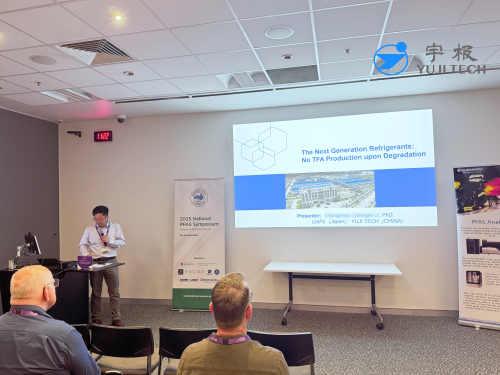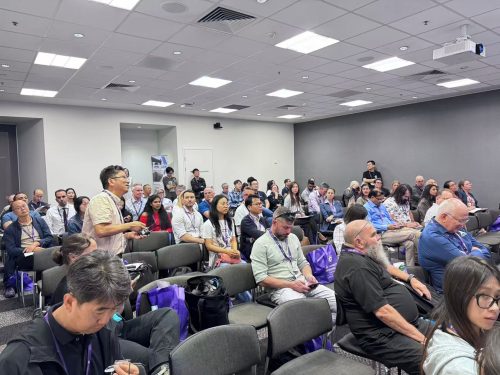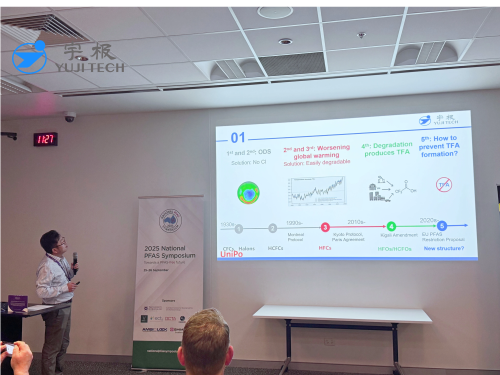Brisbane, Australia | September 25–26, 2025

Figure 1. Yuji experts presenting the fifth-generation refrigerant concept at NFS25
The National PFAS Symposium 2025 (NFS25) was successfully held at the University of Queensland, bringing together leading experts, policymakers, technology providers, industry leaders, and media representatives from over 20 countries.
At this international gathering, Yuji introduced the definition of fifth-generation fluorinated refrigerants in a keynote presentation titled “The Next Generation of Refrigerants: No TFA Formation Upon Degradation.” The presentation drew significant attention from attendees and earned strong recognition from global experts.
This marks Yuji’s first international release of its fifth-generation ODS alternatives concept, following its introduction in China in 2024. Yuji will continue to leverage its R&D and industrialization strengths to foster cross-disciplinary collaboration and accelerate innovation in PFAS solutions
Symposium Focus: PFAS Impact & Governance
NFS25 is Australia’s premier platform for PFAS dialogue, providing a global stage for collaboration across science, industry, and policy. The symposium addressed the entire PFAS chain—from sources of pollution to human health impacts, and from technology development to regulatory oversight—while identifying future research directions.

Figure 2. Symposium venue at NFS25
Yuji’s Fifth-Generation Products Gain Global Attention
At NFS25, Yuji provided a systematic review of the environmental issues associated with fourth-generation refrigerants and, for the first time at an international PFAS forum, introduced the definition of fifth-generation fluorinated refrigerants: Zero ODP, Low GWP, and No TFA Formation Upon Degradation.
This new definition positions fifth-generation refrigerants as the future direction of fluorinated refrigerant development and a novel solution to the growing global challenge of PFAS pollution. It also marks Yuji’s first international release of the fifth-generation concept, following its introduction in China in 2024.

Figure 3. Yuji experts presenting the transition of ODS alternatives and associated challenges.
The Environmental Challenge of Fourth-Generation Refrigerants
Current fourth-generation refrigerants, such as HFO-1234yf, which degrade almost entirely into Trifluoroacetic Acid (TFA) within 10–14 days in the atmosphere. The key concerns about TFA highlighted include:
Regulatory Updates (as of September 2025)
On September 23, 2025, the EU Council and Parliament reached a provisional agreement to classify TFA as a priority substances in surface and groundwaters, with key measures including:
Redefining the Future: The Fifth-Generation Solution by Yuji
Key Characteristics:
Yuji’s Development Approach:
Expert Insights from NFS25
Prof. Cheng Zhang, University of Queensland (Conference Chair):
“Yuji’s presentation was one of the highlights of this symposium. Traditional PFAS management has largely focused on end-of-pipe treatment, with limited insight into the upstream fluorochemical industry. Yuji’s R&D team tackles PFAS issues from F-gas degradation at the source—an effective approach to addressing ultra-short PFAS. Such upstream–downstream, cross-disciplinary exchanges provide fresh perspectives and genuine mutual learning. It is remarkable that Yuji has defined next-generation products and achieved hundred-ton-scale industrial production.”
Prof. Denis O’Carroll, Associate Dean of the School of Civil and Environmental Engineering at the University of New South Wales, Sydney, and a globally recognized authority on PFAS:
“Yuji’s solution offers a highly innovative approach to addressing PFAS challenges at the source. The EU’s latest regulatory actions on TFA highlight a global trend that must be taken seriously, and Yuji’s progress in this area is both timely and significant.”
Prof. Detlef Knappe, Distinguished Professor at North Carolina State University and Deputy Director of NCSU’s Superfund Center for Environmental and Health Effects of PFAS:
“The molecular design of new F-gases is a highly effective approach to addressing the growing challenge of PFAS pollution. Yuji’s strategy in this area is excellent and forward-looking.”
Prof. Knappe also exchanged views with Yuji’s experts on the degradation mechanisms of F-gas refrigerants and how to avoid the formation of TFA, while exploring the latest global trends in ultra-short chain PFAS, particularly TFA, and the technology development directions of major international F-gas producers.
Yuji’s Commitment
Yuji experts note that tackling the growing concern of TFA pollution at its source through technological innovation is becoming a key competitive focus for fluorochemical companies.
Building on over 30 years of expertise, Yuji has introduced the concept of fifth-generation refrigerants in line with current environmental policies. Achieving the right balance between performance, safety, and health depends on advanced tools such as big data and computational chemistry, which enable efficient candidate screening, synthesis route design, and catalyst optimization. From lab-scale synthesis to pilot production at the hundred-ton level, success requires not only substantial investment but also solutions that address the problem at its root.
We believe other innovation-driven companies are taking similar approaches to the TFA challenges. Just as fourth-generation refrigerants diversified into multiple commercial applications, Yuji is confident that fifth-generation solutions will emerge in varied forms to meet global market needs.
Yuji – Leading the Transition to Fifth-Generation Refrigerants.